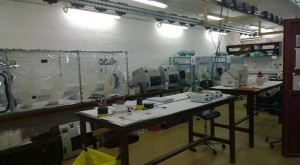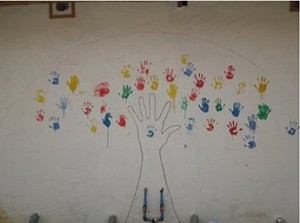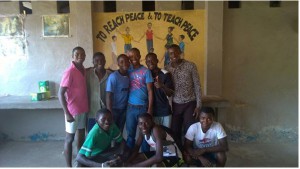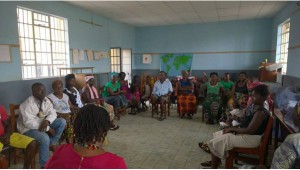May 21, 2015, by Editor
Supporting the fight against Ebola in Sierra Leone
This blog was written by Gemma Bray, a research assistant who works with Professor Kevin Shakesheff in the School of Pharmacy.
I have always admired the people who volunteer to help out in the aftermath of global disasters, be it the Boxing Day Tsunami or the earthquake in Haiti. I would watch the men and women who go to these places and wish I had the skills to help. When the Ebola epidemic worsened in West Africa towards the end of 2014, the Government put out a call for volunteers with lab experience to staff three diagnostic labs in Sierra Leone which were being funded by the UK. Finally I had the skills which would be useful!
I emailed the government stating my interest and I was asked to fill in a brief application form stating how I was qualified and to show that I had the support of my employer. Within 2 weeks I was emailed back with a confirmation to say I had been selected and I would be deployed in March, after first receiving a week of training at Public Health England’s mock up lab at Porton Down.
As this was the week before Christmas I had time to sit down with my family and explain to them what I would be doing. Although they were a little apprehensive at first they came round to the idea and were extremely supportive.
The next couple of months were a blur of psychological evaluations, paperwork, vaccinations and buying things I thought might be useful in Sierra Leone. Does anyone need a battery-operated fan? When my training week arrived I was pleased to see that the other people in my training group were like me, not necessarily experts in the field, just people who wanted to put their skills to use. We spent the week practising the protocols we would be performing once in the field to ensure that all three labs were being run to the same standard.
On the final day we ran a mock-up of a typical day in the lab where we were in charge and our trainers were playing the parts of the medical team and local people. To simulate the African heat, they set the heaters on full and let us sweat it out in our Personal Protective Equipment (PPE) for the day. Thankfully my team and I completed our sample runs and passed the course.
The following week I flew out to Sierra Leone. When I arrived it was late and the airport was small and pretty chaotic. To begin with I couldn’t find anyone who was there to meet me. However, with the help of a local guy from the army and a fellow Brit from the RAF, my driver was tracked down and I set out on the journey to Makeni, the largest town in the north of Sierra Leone.
Upon my arrival around midnight I met some of Team 4. This was the team who had covered February and who would be handing over the lab to my team, at the Ebola Treatment Centre (ETC). I was told I’d be starting that day at 10am, so it was straight in at the deep end.
Two weeks before my arrival, a sick man from the capital, Freetown, had arrived in Rosanda, one of the villages close to Makeni. He sought the help of a local healer. He died the next day of what turned out to be Ebola. In the days following this incident, there was a surge of cases, 42 cases of Ebola having come from Rosanda, which was put under quarantine.
By the time I arrived, many of these people were still being treated at the ETC so the lab was receiving regular samples from them to track their progress. The lab also received samples taken from dead bodies (prior to burial) as a precaution, even if they weren’t suspected of having Ebola, as it is highly infectious at this stage.
My first day in the lab was an eye-opener, it was very busy, incredibly hot and my training had not prepared me for how quickly a well-practised team can work together. I very much felt like a spare part and closely watched to pick up tips on how to improve my techniques. By the third day I was processing my own batches and by the end of the week I was up to speed.
It was around this time that a number of survivors were discharged from the ETC, having tested negative twice in 48 hours. Since the survival rate is about 50%, discharging a patient warrants a celebration. The staff at the ETC, be they medics, members of the wash team or staff from the lab, would all gather around the ‘good shower’ through which the survivors exit the red zone. Here, the survivors are given clean clothes as their own have been incinerated upon their admission. Some of the local staff would bring drums and there would be singing and dancing, and as the survivor exited the red zone they would be led to the survivors’ wall to leave a hand print there.
Some patient discharges were rather bittersweet- a patient might leave to be greeted by no one from their family, either because they had been stigmatised by having Ebola or in some cases because their family had all succumbed to the disease.
In the main, however, the releases were happy affairs. One which particularly stands out for me was a teenage boy who had been very ill and was not expected to survive. Upon leaving, he was greeted by his mother and they were hugging and dancing. One of the staff from the previous lab team had left behind a football and the boy was presented with it, as the medics had found out that he was a big football fan. The expression on his face when he received the football is one of the best memories I have from working out there. There wasn’t a dry eye in the house.
Another emotional experience I had while out there was when I went to visit St Joseph’s School for the Hearing Impaired to take some art supplies, which family and friends from back home had donated. The school teaches deaf children to sign, read and write, and also to learn a trade such as carpentry or gardening so they can support themselves after leaving school. The art supplies were well received and I was asked if I would like to see some of the other work that the school did.
Unexpectedly this consisted of feeding families from the local community where the main earner had died of Ebola but the rest of the family had survived. These people were not entitled to government help and had to find a new way to earn money. St Joseph’s had been helping these people by giving them food each month. Unfortunately, the money for this had finally run out and I was there to see the people from the community come to collect their final food allocation.
The food package consisted of a decent sized bag of rice (the bigger the family the more rice), a bowl of onions, some spices and stock cubes, then some palm oil for cooking and palm soap for washing. Seeing the people’s reaction when they were told this was to be the last food package was really hard, some people cried, some people prayed and worst of all some people just accepted it. There was no anger or outcry the way I imagine there would be if something like this had happened back home. In many cases people had lost several members of their family, been offered little or no help from official channels and couldn’t get work, since the economy had been crippled by the recent outbreak and jobs were very hard to come by.
I left feeling like I had to do something and I told the other people in my group about the situation. Several people kindly donated some of the allowance they’d been given while out there, which was more than we could spend. Between us we managed to get together about £1000 which we donated to further fund Ebola assistance. You can find out more about St Joseph’s school on their web site and make a donation.
Thankfully as the end of our time in Makeni approached, the number of positive cases dropped and there were no new cases during the whole of our final week, with just one patient remaining in the ETC. All too soon Team 6 arrived to relieve us and this time we were the ones showing them how it was done. They picked it up quickly and by the time I left I felt the lab was in safe hands.
My time in Makeni was tiring and very hard at times, but I learned so much while I was there, I made some great friends and I appreciate the little things so much more now that I’m back. I’m glad I was able to contribute to the relief effort in a small way and I would absolutely volunteer for something like this again. For anyone interested in doing something similar I would say “Do it!”.
No comments yet, fill out a comment to be the first





Leave a Reply